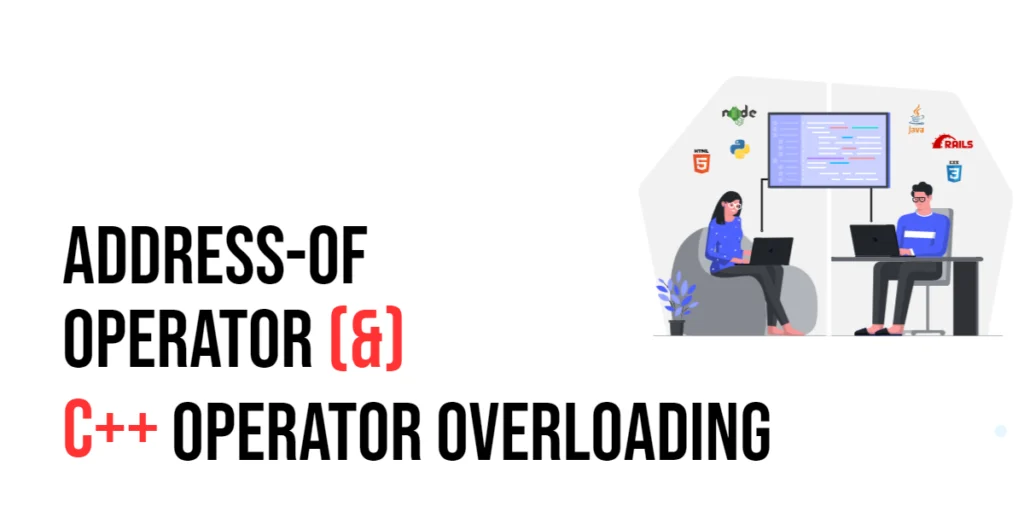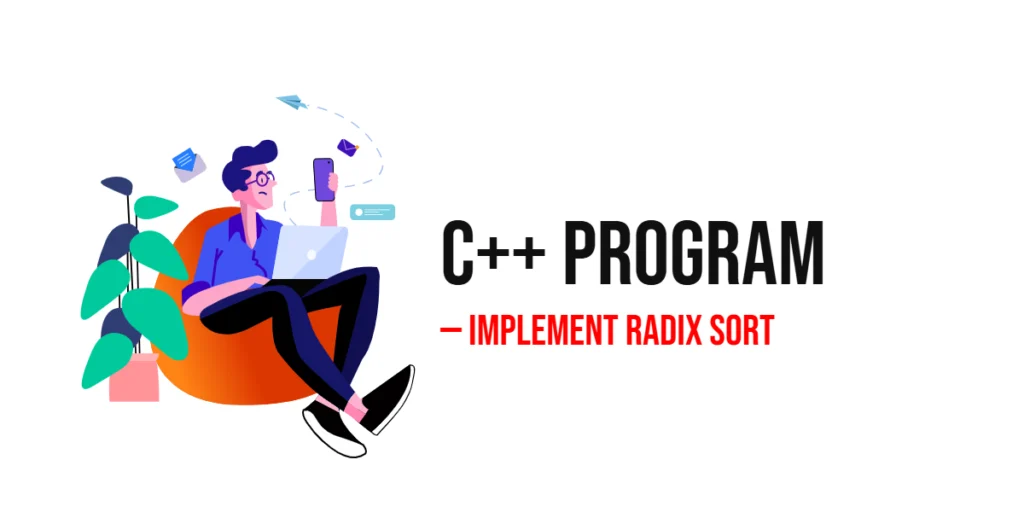In C++, operator overloading lets programmers redefine the way operators work with custom data types. One operator that isn’t often changed but holds great potential is the address-of operator (&). This operator normally tells you the memory address of a variable, but by overloading it, you can gain more control over how your program handles memory. This is especially useful for tasks like managing memory more efficiently, boosting your program’s performance, or creating smart pointers — tools that help manage memory automatically. This guide is designed for beginners and includes detailed examples to help you understand how to effectively overload the address-of operator in C++.

with hands-on learning.
get the skills and confidence to land your next move.
Understanding the Address-of Operator in C++
In the world of C++, the address-of operator (&) serves a simple yet crucial purpose: it fetches the memory address of a variable. For example, consider an integer variable int a = 5;. When you apply the address-of operator (&a), it returns the memory address where a is stored. This operation is typically straightforward for basic data types like integers and floats. However, for user-defined types—classes and structs—things can get a bit more complex. This complexity opens the door to “operator overloading,” which allows developers to redefine how certain operators, like &, behave when used with their custom types.
Why Overload the Address-of Operator?
You might wonder why one would need to overload an operator that already has a well-defined function. There are two primary reasons:
- Custom Memory Management: In scenarios requiring precise control over memory allocation—such as in systems with limited resources or those requiring specialized memory handling—developers can use operator overloading to customize how and where objects are stored. This can help optimize performance and efficiency.
- Smart Pointers Implementation: Smart pointers are advanced data structures that simulate traditional pointers but include automatic memory management to prevent memory leaks. Overloading the address-of operator is critical in creating smart pointers, as it allows the developer to control pointer behavior tightly, ensuring resources are managed safely and effectively.
How to Overload the Address-of Operator
To overload the address-of operator, you define a member function in your class that returns a pointer to the class type. This function should be marked with the operator keyword followed by an ampersand (&). This tells C++ that you’re providing a custom implementation for the address-of operator.
Syntax for Overloading:
ReturnType* operator&();Here, ReturnType is typically a pointer to the type of your class or struct. This syntax enables you to intercept any use of the & operator on instances of your class, giving you a chance to execute additional code before returning the address.
By overloading the address-of operator, developers can fine-tune how objects are addressed and interacted with at a memory level, allowing for more robust and reliable applications, particularly in environments where standard memory management practices might not be sufficient or optimal. Whether it’s enhancing performance or ensuring resource safety, mastering this operator overloading can be a valuable skill in a C++ programmer’s toolkit.
Example 1: Basic Overloading of the Address-of Operator
Let’s delve into a simple but effective demonstration of overloading the address-of operator (&) within a basic class structure. This example aims to show you how tweaking this operator can alter its default behavior, giving you creative control over its functionality in your C++ programs.
Here’s a straightforward piece of code where we create a class named MyClass. This class will store an integer value and include a special twist on how we handle obtaining its address:
#include <iostream>
class MyClass {
private:
int value;
public:
// Constructor initializes the class with an integer value
MyClass(int v) : value(v) {}
// Overloading the address-of operator
MyClass* operator&() {
// Print a message when the operator is used
std::cout << "Address-of operator overloaded." << std::endl;
// Return the address of this object
return this;
}
// Function to display the value of the member variable
void displayValue() const {
std::cout << "The value is: " << value << std::endl;
}
};
int main() {
// Create an object of MyClass with a value of 10
MyClass obj(10);
// Display the value stored in obj
obj.displayValue();
// Using the overloaded address-of operator
MyClass* ptr = &obj;
// Using the pointer to access and display the value
ptr->displayValue();
return 0;
}In the code above:
- We initiate an object obj of MyClass and set its value to 10.
- Calling displayValue() on obj directly shows the value stored within, which is 10.
Normally, using &obj would straightforwardly yield the memory address of obj. However, because we’ve overloaded the address-of operator in MyClass, using &obj now triggers a message (“Address-of operator overloaded.”) and then returns the actual address of the object. We then use the returned address (stored in ptr) to access and display the value of obj again through the pointer.
This modification might seem small, but it’s a powerful demonstration of how C++ allows you to manipulate even fundamental aspects of how objects are handled. Overloading the address-of operator in this manner could be particularly useful in scenarios where tracking object address retrieval is crucial, such as in debugging or custom memory management scenarios. By intercepting the normal operation of &, we can add additional functionality (like logging or modifying access permissions) before the address is actually used. This provides a blend of control and customization that can help in creating more robust and tailored software.
Example 2: Simplified Smart Pointer Implementation
To better understand the practical benefits of overloading the address-of operator (&), let’s dive into implementing a simplified version of a smart pointer. Smart pointers are advanced tools in C++ that manage the memory of pointer objects automatically, helping to prevent memory leaks and other common pitfalls associated with raw pointer use.
What is a Smart Pointer?
A smart pointer in C++ is an object that simulates the behavior of a traditional pointer while also providing automatic memory management. It takes care of allocating and deallocating memory as needed, ensuring that the program uses resources efficiently and safely.
Implementing a Basic Smart Pointer
In this example, we will create a basic smart pointer that can point to an integer. This smart pointer will be equipped with features that allow it to behave somewhat like a normal pointer, but with the added benefit of automatic memory management.
Here is how we can implement such a smart pointer:
#include <iostream>
template <typename T>
class SmartPointer {
private:
T* ptr; // The actual pointer to the data
public:
// Constructor
explicit SmartPointer(T* p = nullptr) : ptr(p) {}
// Destructor
~SmartPointer() {
delete ptr; // Automatically delete the pointer upon destruction of SmartPointer
}
// Overload dereference operator
T& operator*() {
return *ptr; // Allows dereferencing like a normal pointer
}
// Overloading the address-of operator
T* operator&() {
delete ptr; // Delete the currently held pointer
ptr = nullptr; // Set the pointer to null to avoid dangling pointer issues
std::cout << "Resetting pointer." << std::endl;
return ptr; // Return the new, null pointer address
}
// Overload the arrow operator
T* operator->() {
return ptr; // Allows access to the member functions of T (if T is a class)
}
};
int main() {
SmartPointer<int> sp(new int); // Create a smart pointer that points to a new integer
*sp = 20; // Dereference sp and assign 20 to the pointed-to integer
std::cout << "The value is: " << *sp << std::endl; // Display the value
// Resetting the pointer
&sp; // Use the overloaded address-of operator to reset the pointer
if (!&sp) { // Check if the pointer is now null
std::cout << "Pointer is reset." << std::endl;
}
return 0;
}In this example:
- Constructor and Destructor: The constructor initializes the pointer, and the destructor ensures that the memory is freed when the SmartPointer object is destroyed, preventing memory leaks.
- Operator Overloads: The dereference (*) and arrow (->) operators are overloaded to enable the smart pointer to be used similarly to normal pointers. The address-of operator (&) is uniquely overloaded to reset the pointer by deleting the associated memory and setting the pointer to nullptr, thus safeguarding against dangling pointers.
This example shows how overloading the address-of operator in the context of smart pointers can lead to safer and more effective memory management in C++. By handling the deallocation automatically, the smart pointer helps prevent common errors such as memory leaks and dangling pointers, making your C++ applications more robust and error-free.
Conclusion
In C++, overloading the address-of operator (&) gives programmers a powerful tool to manage how objects are accessed and stored in memory. This might sound complex, but it essentially allows you to control what happens when your program asks where an object is stored. While you might not use this feature in your daily coding tasks, learning how to apply it can be incredibly useful for specialized needs such as managing memory in unique ways or creating smart pointers, which help prevent memory leaks by managing resources automatically.
Using this advanced feature of C++ should be done with care. It’s like having a sophisticated tool in your toolkit; you don’t need it all the time, but for certain jobs, it’s the best and sometimes the only tool for the job. Always make sure that when you decide to use operator overloading, it enhances your code’s performance and safety. This thoughtful approach will make your programs more robust and maintainable, turning a complex feature into a beneficial asset in your programming endeavors.







